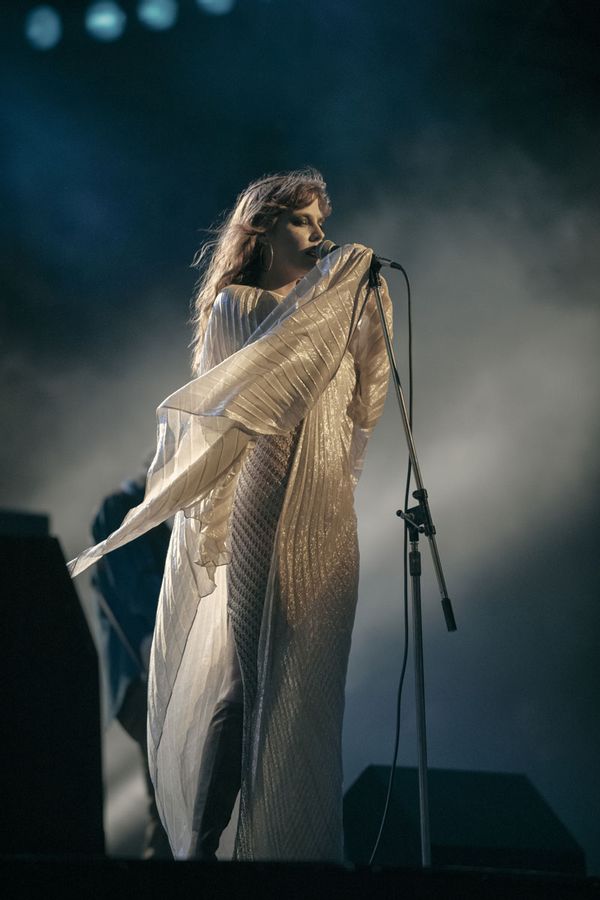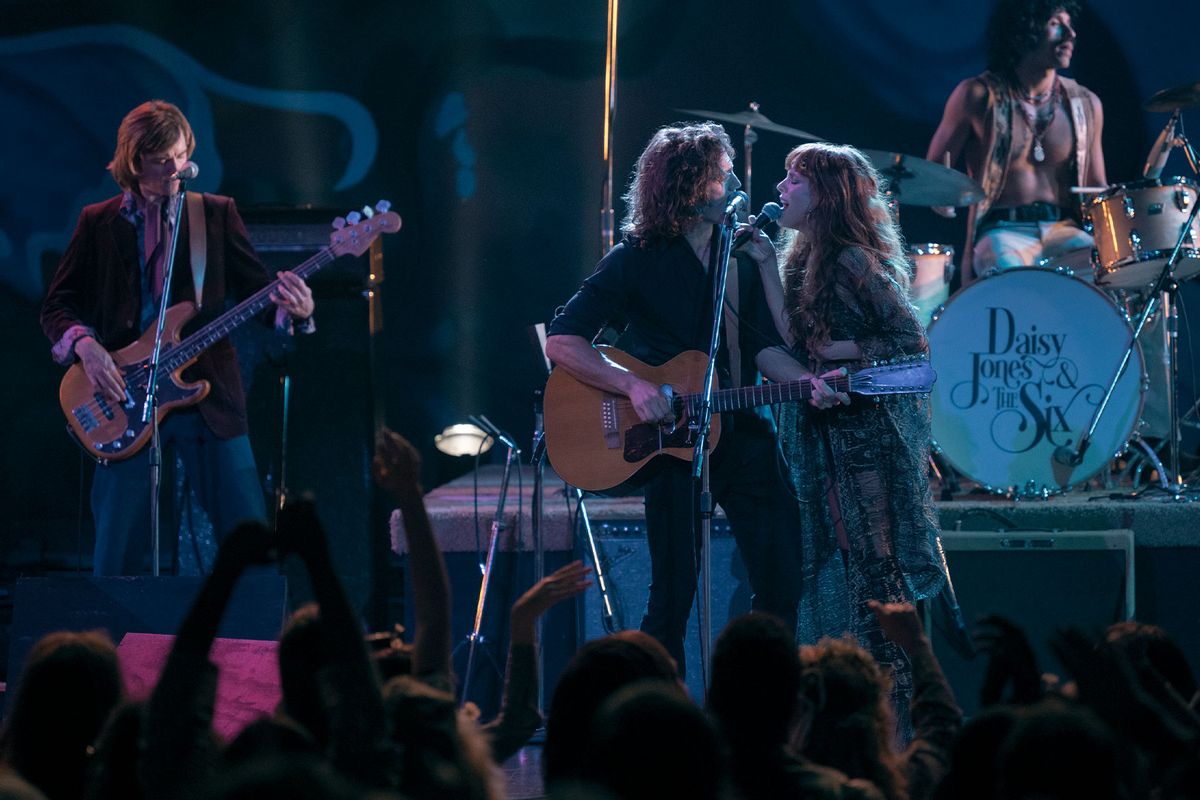I was fortunate enough to see Fleetwood Mac in concert twice before the legendary quintet broke apart and Christine McVie passed away. The first time I saw the band, I thought Lindsey Buckingham was the coolest. The second time, I realized Stevie Nicks is.
Yes, in both shows, the famous pair sang "Silver Springs" while looking directly at each other. They practice looking at each other, the stranger in the seat next to me whispered conspiratorially. But I don't think you would need to practice eye contact while performing in such proximity – sometimes sharing the same microphone – even for musicians like Buckingham and Nicks with their romantic history. Or, especially for musicians like Buckingham and Nicks.
It comes out on the stage, all of it, the past and its disappointments, what could have been, what was and maybe what still is. Or at least, we really want it to still be there, the flicker of love between people who created such great songs because of (and despite) each other.
With the arrival of "Daisy Jones & the Six," Prime Video's much anticipated series about a band in the 1970s and their rocky rise to fame, we have another example of toxic rock love: musicians who meet, break apart but have to keep coming together, on stage and in song, night after night. What is it about this refrain? Why do we adore this story so much and why do we keep telling it?
"Daisy Jones & The Six" is adapted from Taylor Jenkins Reid's best-selling novel of the same name. Published in 2019, it's written in the style of an oral history, i.e. the band and those who knew, loved and worked with them speaking as if to a journalist, spilling secrets about each other and trying to unravel the tangled past. Reid was inspired by the story of Fleetwood Mac after first glimpsing Nicks on TV when she was 13.
"You know how easy it is to screw up your entire life by sleeping with somebody in your own band?"
Upon rewatching the Fleetwood Mac televised reunion show "The Dance" as an adult, Reid told Hello Sunshine, "Stevie sung 'Silver Springs,' like a woman scorned, holding that microphone like a weapon, drilling holes into Lindsey's head with her eyes as she sang that her voice would haunt him. I was savvier then, I understood that sometimes looking like you're in love or in hate are things you ramp up a bit to make a good show. I also understood then what I could never have conceived of in 1997: Love makes no goddamn sense."
The band in "Daisy Jones" rises to prominence in the '70s, like Fleetwood Mac. Also like Fleetwood Mac, it includes several couples. Sort of. The frontman of The Six is Billy (Sam Claflin) a handsome, Romantic guitarist and singer/songwriter with the swooping hair and the smolder of a star (like Buckingham). But soon he must share the microphone with Daisy (Riley Keough), an ethereal beauty with the pipes and songwriting prowess to match. And a substance abuse issue.
Daisy has the wild hair, equally mesmerizing dance moves and flowy dresses of Nicks (with her red hair, Daisy resembles more the contemporary Florence Welch). And like one of rock and roll's most legendary couples, Billy and Daisy have an intense creative partnership that may go deeper than that.
 Riley Keough (Daisy Jones) in "Daisy Jones and The Six" (Lacey Terrell/Prime Video)Relationships among band members is not a new or unlikely idea. You're working with someone, often long into the night. There's the heightened environment of performing, made more fraught by the prevalence of free-flowing alcohol and drugs. From The Cramps to Ike and Tina Turner, from ABBA to Blondie to Sonic Youth, band members fall in love, get married, break up.
Riley Keough (Daisy Jones) in "Daisy Jones and The Six" (Lacey Terrell/Prime Video)Relationships among band members is not a new or unlikely idea. You're working with someone, often long into the night. There's the heightened environment of performing, made more fraught by the prevalence of free-flowing alcohol and drugs. From The Cramps to Ike and Tina Turner, from ABBA to Blondie to Sonic Youth, band members fall in love, get married, break up.
We love rock 'n roll romances because we want to believe the stories in songs are real, including love stories.
It's this last stage we're most interested in. Humans love drama. Way to bring theatrics into music, the issues that aren't left at the stage door. The White Stripes pretended to be brother and sister, though Jack and Meg White were married (then divorced in 2000). Fans blamed (and some continue to blame) Yoko Ono and her relationship and marriage with John Lennon for the Beatles' breakup while other fans bemoaned Linda McCartney's presence in husband Paul McCartney's later band Wings.
It's playing with fire, to fall (or not fall) for someone you work with, someone you must continue to work with in order to preserve this art, money and career-making thing called the band. As Karen, the keyboardist for The Six, says in the book, "You know how easy it is to screw up your entire life by sleeping with somebody in your own band?"
But when band members fall in and out of love, great art can come from it, as art can come from all experiences, maybe especially the difficult ones. Writing is a way to process. And singing the lyrics you wrote about someone to their face in front of thousands of screaming fans? That's got to be therapeutic (though more toxic than most therapy).
 Riley Keough (Daisy Jones) and Sam Claflin (Billy Dunne) in "Daisy Jones and The Six" (Lacey Terrell/Prime Video)We love the messy band story because it feels like a window into a world most of us will never experience. Here's what it's truly like to tour with someone for months, to have feelings for them, to be frustrated or hurt by them but still have to dress up and perform next to them. Drama makes untouchable-seeming rock stars more down-to-earth. They have problems. They fight. They blow up their own lives in the name of love.
Riley Keough (Daisy Jones) and Sam Claflin (Billy Dunne) in "Daisy Jones and The Six" (Lacey Terrell/Prime Video)We love the messy band story because it feels like a window into a world most of us will never experience. Here's what it's truly like to tour with someone for months, to have feelings for them, to be frustrated or hurt by them but still have to dress up and perform next to them. Drama makes untouchable-seeming rock stars more down-to-earth. They have problems. They fight. They blow up their own lives in the name of love.
We love rock 'n roll romances because we want to believe the stories in songs are real, including love stories. We all want to be insiders, to know the true tale behind the music. Fleetwood Mac's "Go Your Own Way"? That's about Buckingham and Nicks, though Nicks swears the line "packing up, shacking up is all you want to do" was a cruel invention. "He knew it wasn't true," she told Rolling Stone in 1997, the year "Daisy Jones & The Six" writer Reid first noticed the band. "It was just an angry thing that he said. Every time those words would come out onstage, I wanted to go over and kill him."
Nicks' song "Silver Springs" is about the breakup too. Originally kicked off the album "Rumors," it became a beloved B-side to . . . "Go Your Own Way."
Want a daily wrap-up of all the news and commentary Salon has to offer? Subscribe to our morning newsletter, Crash Course.
We also want to believe art is the most important thing, that it can outlast even love. Everything lost, burnt to the ground or tarnished matters not in the face of making something that will last for generations, touch or save millions of lives. But as Nicks told musician Sarah McLachlan (who also married and divorced a band member) in a 2004 interview, "I have been through just about every possible thing that you could go through, and I've just about given up everything you could possibly give up for this. And I wonder sometimes if I made the right decisions."
Some love – and some bands – burn brightly and hot, and burn themselves out like a comet. Some artists, like the 74-year-old Nicks, endure. She added to McLachlan, "I'll give you my phone number so that you can call me when you're in the middle of Toronto, bummed out, and I can tell you that everything's gonna be all right."
"Daisy Jones & The Six" premieres on Prime Video March 3. Watch a trailer via YouTube below.

Shares